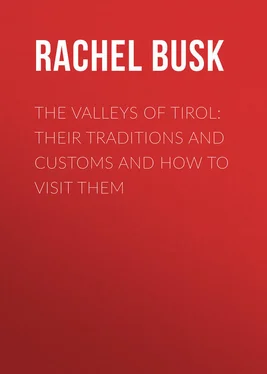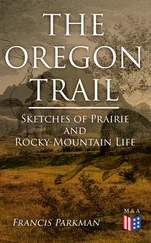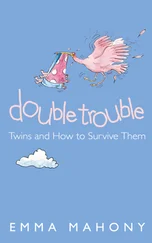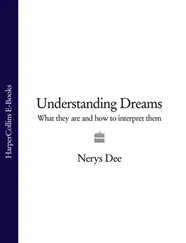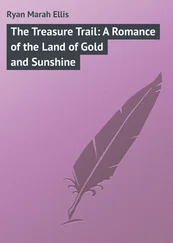Rachel Busk - The Valleys of Tirol - Their traditions and customs and how to visit them
Здесь есть возможность читать онлайн «Rachel Busk - The Valleys of Tirol - Their traditions and customs and how to visit them» — ознакомительный отрывок электронной книги совершенно бесплатно, а после прочтения отрывка купить полную версию. В некоторых случаях можно слушать аудио, скачать через торрент в формате fb2 и присутствует краткое содержание. Жанр: foreign_antique, foreign_prose, Путешествия и география, на английском языке. Описание произведения, (предисловие) а так же отзывы посетителей доступны на портале библиотеки ЛибКат.
- Название:The Valleys of Tirol: Their traditions and customs and how to visit them
- Автор:
- Жанр:
- Год:неизвестен
- ISBN:нет данных
- Рейтинг книги:3 / 5. Голосов: 1
-
Избранное:Добавить в избранное
- Отзывы:
-
Ваша оценка:
- 60
- 1
- 2
- 3
- 4
- 5
The Valleys of Tirol: Their traditions and customs and how to visit them: краткое содержание, описание и аннотация
Предлагаем к чтению аннотацию, описание, краткое содержание или предисловие (зависит от того, что написал сам автор книги «The Valleys of Tirol: Their traditions and customs and how to visit them»). Если вы не нашли необходимую информацию о книге — напишите в комментариях, мы постараемся отыскать её.
The Valleys of Tirol: Their traditions and customs and how to visit them — читать онлайн ознакомительный отрывок
Ниже представлен текст книги, разбитый по страницам. Система сохранения места последней прочитанной страницы, позволяет с удобством читать онлайн бесплатно книгу «The Valleys of Tirol: Their traditions and customs and how to visit them», без необходимости каждый раз заново искать на чём Вы остановились. Поставьте закладку, и сможете в любой момент перейти на страницу, на которой закончили чтение.
Интервал:
Закладка:
häss , clothing.
res , speech.
tobel , a ravine.
feel , a girl; spudel , an active girl; schmel , a smiling girl.
hattel , a goat; mütl , a kid.
Atti , 5 5 See it in use below, p. 28, and comp. Etruscan Res. p. 302, note.
father, and datti , ‘ daddy .’
frei , pleasant.
zoana , a wattled basket.
schlutta and schoope , a smock-frock.
täibe , anger.
kîba’ , to strive.
rêra’ , to weep. 6 6 Somewhat like pleurer . A good many words are like French, as gutschle , a settle (couche); schesa , a gig; and gespusa , mentioned above, is like épouse; and au , for water, is common over N. Tirol, as well as Vorarlberg, e. g. infra , pp. 24, 111. &c.
musper , merry.
tribiliera’ , to constrain.
waedle , swift.
raetig werden , to deliberate.
Tripstrüll , = Utopia.
wech , spruce, also vain.
laegla , a little vessel.
hengest , a friendly gathering of men. 7 7 Comp. Etrus. Res. 339–41.
koga , cursed, also corrupted.
fegga , a wing.
krom , a gift.
blaetz , a patch.
grind , a brute’s head, a jolterhead.
bratza , a paw, an ugly hand.
briegga’ , to pucker up the face ready for crying.
deihja , a shepherd’s or cattle-herd’s hut. 8 8 Several places have received their name from having grown round such a hut; some of these occur outside Vorarlberg, as for instance Kühthei near St. Sigismund ( infra , p. 331) in the Lisenthal, and Niederthei in the Œtzthal.
also dieja , which is generally reserved for a hut formed by taking advantage of a natural hole, leaving only a roof to be supplied.
garreg , prominent. (I think that gareggiante in Italian is sometimes used in a similar sense.)
Other words in Vorarlberg dialect are very like English, as: —
Witsch , a witch.
Pfülle , a pillow.
rôt , wrath.
gompa’ , to jump.
gülla , a gulley.
also datti and schmel , mentioned already.
Aftermötig (after-Monday) is a local name for Tuesday.
In Wälsch-Tirol, they have carega , a chair.
bagherle , a little carriage, a car.
troz , a mountain path.
Malga , 9 9 Comp. ma = earth, land, Etrus. Res. pp. 121, 285.
equivalent to Alp, a mountain pasture.
zufolo , 10 10 Comp. subulo , Etrus. Res. 324. Dennis i. 339.
a pipe.
And Turlulù ( infra , p. 432) is nearly identical in form and sound with a word expounded in Etrus. Researches , p. 299.
Of ‘ Salvan ’ and ‘ Gannes ,’ I have already spoken. 11 11 Infra , p. 411.
But all this is, I am aware, but a mere turning over of the surface; my only wish is that some one of stronger capacity will dig deeper. Of many dialects, too, I have had no opportunity of knowing anything at all. Here are, however, a few suggestive or strange words from North and South Tirol: —
Pill, which occurs in various localities 12 12 See e.g., infra , p. 202.
of both those provinces to designate a place built on a little hill or knoll, is identical with an Etruscan word to which Mr. Isaac Taylor gives a similar significance. 13 13 Etrus. Res. p. 330.
I do not overlook Weber’s observation that ‘Pill is obviously a corruption of Büchel (the German for a knoll), through Bühel and Bühl ;’ but, which proceeds from which is often a knotty point in questions of derivation, and Weber did not know of the Etruscan ‘pil.’
Ziller and celer I have already alluded to, 14 14 P. 79.
though of course it may be said that the Tirolean river had its name from an already romanised Etruscan word, and does not necessarily involve direct contact with the Etruscan vocabulary.
Grau-wutzl is a name in the Zillerthal for the Devil.
Disel , for disease of any kind.
Gigl , a sheep.
Kiess , a heifer.
Triel , a lip.
Bueg , a leg.
knospen stands in South-Tirol for wooden shoes, and
fokazie for cakes used at Eastertide. ( Focaccia is used for ‘cake’ in many parts of Italy, and ‘dar pan per focaccia’ is equivalent to ‘tit for tat’ all over the Peninsula.)
It remains only to excuse myself for the spelling of the word Tirol. I have no wish to incur the charge of ‘pedantry’ which has heretofore been laid on me for so writing it. It seems to me that, in the absence of any glaring mis-derivation, it is most natural to adopt a country’s own nomenclature; and in Tirol, or by Tirolean writers, I have never seen the name spelt with a y . I have not been able to get nearer its derivation than that the Castle above Meran, which gave it to the whole principality, was called by the Romans, when they rebuilt it, Teriolis. Why they called it so, or what it was called before, I have not been able to learn. The English use of the definite article in naming Tirol is more difficult to account for than the adoption of the y , in which we seem to have been misled by the Germans. We do not say ‘ the France’ or ‘ the Italy;’ even to accommodate ourselves to the genius of the languages of those countries, therefore, that we should have gone out of our way to say ‘ the Tyrol’ when the genius of that country’s language does not require us so to call it, can have arisen only from a piece of carelessness which there is no need to repeat.
CHAPTER I.
VORARLBERG
… Everywhere
Fable and Truth have shed, in rivalry,
Each her peculiar influence. Fable came,
And laughed and sang, arraying Truth in flowers,
Like a young child her grandam. Fable came,
Earth, sea, and sky reflecting, as she flew,
A thousand, thousand colours not their own. – Rogers.
‘Traditions, myths, legends! what is the use of recording and propagating the follies and superstitions of a bygone period, which it is the boast of our modern enlightenment to have cast to the winds?’
Such is the hasty exclamation which allusion to these fantastic matters very frequently elicits. With many they find no favour because they seem to yield no profit; nay, rather to set up a hindrance in the way of progress and culture.
Yet, on the other hand, in spite of their seeming foolishness, they have worked themselves into favour with very various classes of readers and students. There is an audacity in their imagery which no mere sensation-writer could attempt without falling Phaeton-like from his height; and they plunge us so hardily into a world of their own, so preposterous and so unlike ours, while all the time describing it in a language we can understand without effort, that no one who seeks occasional relief from modern monotony but must experience refreshment in the weird excursions their jaunty will-o’the-wisp dance leads him. But more than this; their sportive fancy has not only charmed the dilettante; they have revealed that they hold inherent in them mysteries which have extorted the study of deep and able thinkers, one of whom 15 15 Professor Max Müller, Chips from a German Workshop .
insisted, now some years ago, that ‘by this time the study of popular tales has become a recognized branch of the studies of mankind;’ while important and erudite treatises from his own pen and that of others 16 16 Rev. G. W. Cox, Prof. De Gubernatis, Dr. Dasent, &c.
have elevated it further from a study to a science.
Интервал:
Закладка:
Похожие книги на «The Valleys of Tirol: Their traditions and customs and how to visit them»
Представляем Вашему вниманию похожие книги на «The Valleys of Tirol: Their traditions and customs and how to visit them» списком для выбора. Мы отобрали схожую по названию и смыслу литературу в надежде предоставить читателям больше вариантов отыскать новые, интересные, ещё непрочитанные произведения.
Обсуждение, отзывы о книге «The Valleys of Tirol: Their traditions and customs and how to visit them» и просто собственные мнения читателей. Оставьте ваши комментарии, напишите, что Вы думаете о произведении, его смысле или главных героях. Укажите что конкретно понравилось, а что нет, и почему Вы так считаете.
